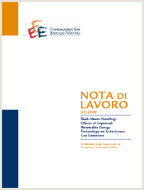Work Values in Western and Eastern Europe

20.12.2011
Benno Torgler
P20, D10, J28, J17, J22
Work Values, Job Satisfaction, Work-Leisure Relationship, Work-Family Centrality, Eastern Europe, Western Europe
Economy and Society
Giuseppe Sammarco
The paper reports on work values in Europe. At the country level we find that job satisfaction is related to lower working hours, higher well-being, and a higher GDP per capita. Moving to the micro level, we turn our attention from job satisfaction to analyse empirically work centrality and work value dimensions (without exploring empirically job satisfaction) related to intrinsic and extrinsic values, power and social elements. The results indicate substantial differences between Eastern and Western Europe. Socio-demographic factors, education, income, religiosity and religious denomination are significant influences. We find additional differences between Eastern and Western Europe regarding work-leisure and work-family centrality that could be driven by institutional conditions. Furthermore, hierarchical cluster analyses report further levels of dissimilarity among European countries.
